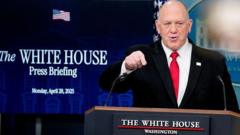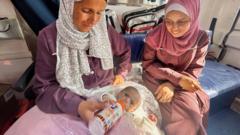The deportation of three young US citizen children, including a four-year-old diagnosed with Stage 4 cancer, to Honduras has drawn significant attention and criticism from advocacy groups and legal representatives. This disturbing event occurred last week when the two mothers, who were living in the US illegally, were removed along with their children, aged two, four, and seven, by New Orleans Immigration and Customs Enforcement (ICE) officials on Friday, according to the American Civil Liberties Union (ACLU).
Three US Citizens, Including a Child with Cancer, Deported to Honduras Amid Controversy

Three US Citizens, Including a Child with Cancer, Deported to Honduras Amid Controversy
A heartbreaking situation unfolds as three US citizen children, including one battling cancer, were deported to Honduras with their mothers, raising serious legal and ethical concerns.
Tom Homan, Donald Trump’s border czar, stated that the mothers opted for their children to accompany them, asserting that US citizen status does not grant immunity against immigration laws. Homan emphasized that families are being removed together instead of experiencing separations, an approach that faced backlash during Trump’s earlier presidency. He told reporters, “We’re keeping families together... There’s a parental decision,” while downplaying the term "deported," suggesting that if parents decided their children should leave, it wasn’t a case of deportation by the government.
However, a federal judge expressed serious concerns about the legal processes involved. The court noted a "strong suspicion" that one of the children was deported without due process. The Louisiana-born two-year-old's family was detained after scheduling a routine appointment with immigration officials in New Orleans on April 22, but their legal representatives claim they were denied appropriate access to information and communication during the ordeal.
In a related statement, White House Press Secretary Karoline Leavitt highlighted the administration’s aggressive measures regarding immigration enforcement in the initial 100 days of Trump's return to the presidency. Leavitt also mentioned upcoming executive orders aimed at identifying "sanctuary cities," which are localities that restrict cooperation with federal immigration authorities.
This situation unfolds as many undocumented immigrants continue to be apprehended under recent policies, raising poignant questions about the treatment of families and citizens within the US legal system.
The families affected now face uncertainty in Honduras, particularly affecting the child's health and access to necessary medical care.
However, a federal judge expressed serious concerns about the legal processes involved. The court noted a "strong suspicion" that one of the children was deported without due process. The Louisiana-born two-year-old's family was detained after scheduling a routine appointment with immigration officials in New Orleans on April 22, but their legal representatives claim they were denied appropriate access to information and communication during the ordeal.
In a related statement, White House Press Secretary Karoline Leavitt highlighted the administration’s aggressive measures regarding immigration enforcement in the initial 100 days of Trump's return to the presidency. Leavitt also mentioned upcoming executive orders aimed at identifying "sanctuary cities," which are localities that restrict cooperation with federal immigration authorities.
This situation unfolds as many undocumented immigrants continue to be apprehended under recent policies, raising poignant questions about the treatment of families and citizens within the US legal system.
The families affected now face uncertainty in Honduras, particularly affecting the child's health and access to necessary medical care.




















